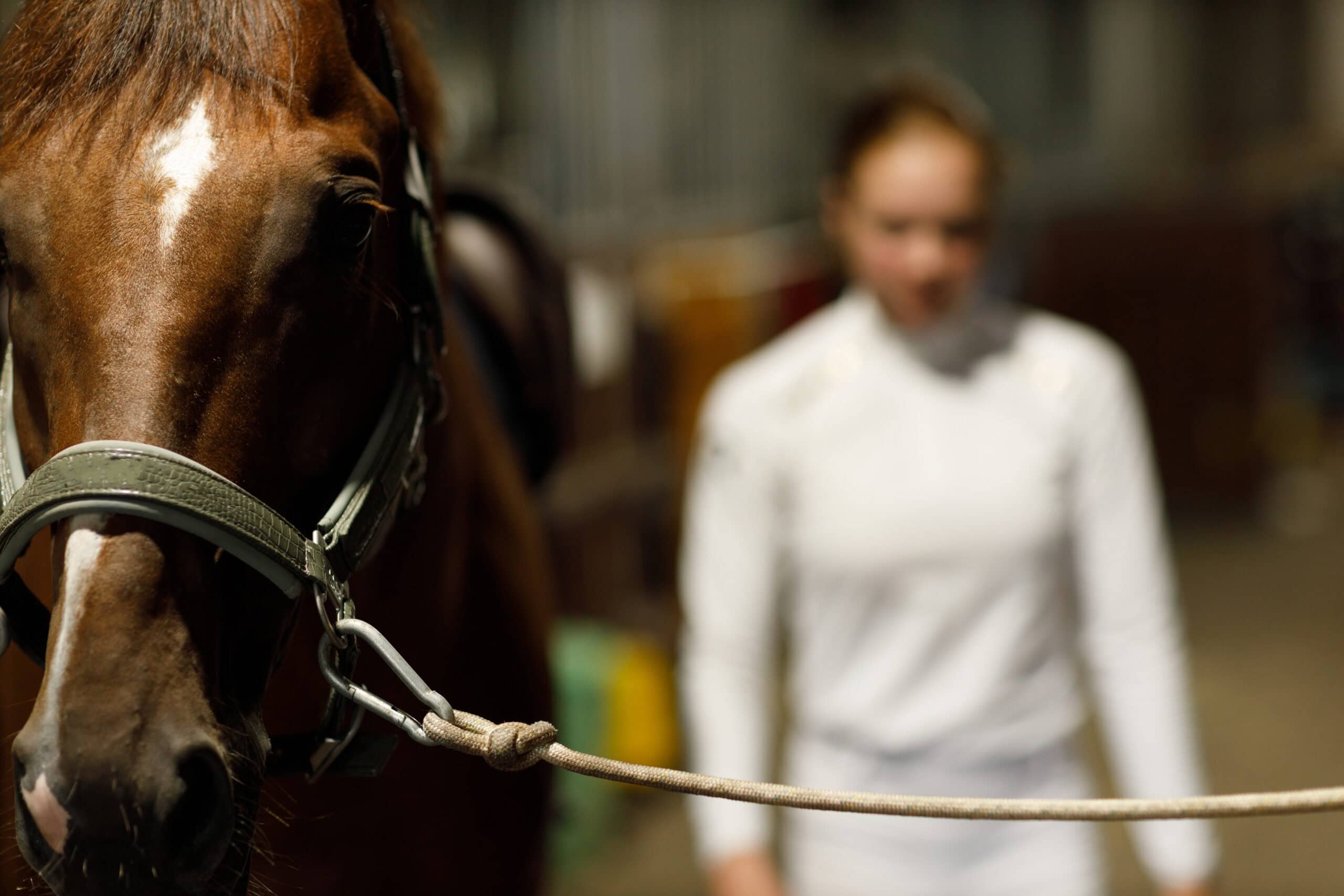Top 10 Horse Buying Mistakes
At Equine Legal Solutions, buying and selling horses are one of our top issues. Here are the top 10 mistakes we encounter regularly.


By Rachel Kosmal McCart
At Equine Legal Solutions, horse purchase and sale disputes generate more inquiries than any other topic. Here are the top horse-buying mistakes we see horse shoppers, even experienced ones, make.
1. Not Getting a Veterinary Prepurchase Examination (PPE)
Even if the horse is FREE, not getting a veterinary prepurchase examination (PPE) is a bad economic decision. For example, let’s say you are buying a child’s pony for $5,000. A PPE would add $500-1,000 (or more) to the initial cost, so you decide against it. You and your child try the pony, and she appears to be a great fit, so you buy the pony and take her home. Two days later, the pony is dead lame. You have the vet out and, after paying more than $800 for a farm call, a lameness exam and diagnostics, you find out the pony has advanced navicular syndrome. The seller refuses to take the pony back, noting the pony was sound when you looked at her and you declined to have a PPE. You suspect the seller drugged the pony to mask the unsoundness. However, without a blood sample drawn during a PPE, you can’t prove the pony was drugged when you looked at her. You are now paying for the pony’s ongoing expenses and vet bills, and your daughter still doesn’t have a pony to ride. You can’t sell the pony to someone else (ethically, at least) because she is lame. Guess what: You have an expensive pasture ornament AND you’re buying another pony (but this time, you’re getting a PPE).
Not getting a PPE because a horse is “young” is also a bad economic decision. Even if the horse is a weanling, it can have issues affecting its long-term soundness and performance potential, and those issues are not always immediately apparent to even an experienced horse owner. For example, a thorough PPE might reveal osteochondritis dissecans (OCD) or wobbler syndrome. Also, many 2- and 3-year old performance horses are ridden hard to prepare them for futurities — and suffer chronic soundness issues by age 4 or 5 as a result. A thorough veterinary evaluation can help you avoid buying an expensive problem.
2. Buying a Horse Sight Unseen
In today’s internet economy, we can shop for horses nationwide and even internationally, greatly increasing the selection of quality horses we can choose from. However, technological advances have also made it easier than ever for unscrupulous horse sellers to unload their equine problems onto unsuspecting buyers. A savvy computer user can edit photos and videos to disguise conformation flaws, erase blemishes and even change markings and eye color. Even a video can be very misleading. You have no way of knowing whether two hours of footage was edited into 20 minutes of useable video because the horse was acting up in all but 20 minutes of the filming. The horse could be worked down for hours before the video was taken, drugged to mask lameness or temperament issues or both. The video could be shot from an angle that makes the horse look bigger than it is. Photos and videos could be old — taken when the horse was fit, sound and in peak performance. And maybe, the “seller” is really a scammer who has stolen someone else’s photos and videos and doesn’t even have a horse for sale! The only way to truly evaluate a horse thoroughly is to try it out in person.
3. Putting a Deposit Down on a Horse Without a Written Purchase Agreement
Before any money changes hands, you should have a signed written purchase agreement describing the terms of the purchase, including under what circumstances your deposit will be refunded or forfeited. Otherwise, the purchase could fall through, and you could lose your deposit. For example, let’s say you verbally agree to purchase a horse subject to a PPE and pay the seller a $10,000 deposit to hold the horse. The vet you want to use is booked up, so it takes two weeks to get the PPE done. During the PPE, you discover the horse has some soundness issues that are deal-breakers for you. You tell the seller you’re not buying the horse and why and ask for your deposit back. The seller refuses to refund your deposit, insisting the horse has never taken a lame step in its life, your vet is being “too picky” and they had to turn away other buyers during the two weeks it took you to get the PPE done. Without a written agreement, you have two unappealing choices: spend more time and money (with no hope of getting it back) to take the seller to court with a “he said, she said” case or saying goodbye to $10,000.
4. Not Reviewing the Registration Papers and Transfer Forms Carefully
A careful review of registration papers and the transfer form at the time of purchase can help you avoid potential problems. In just a few minutes, you should be able to determine if the papers match the horse you are buying, if the seller is the horse’s registered owner and if the registered owner has signed the transfer forms. Just remember, the easiest horses to provide fake papers for are solid with no markings. And it is very common for the registered owner to be different than the seller, because horses often change hands without the registration being changed to the new owner’s name. To register the horse in your name, you will need a transfer form signed by the registered owner.
5. Taking a Horse on Trial Without a Written Agreement
Before the horse leaves the seller’s property, you should have a signed written purchase agreement that includes the terms of the trial period and purchase, including under what circumstances you can return the horse to the seller. Otherwise, you might find yourself in a situation where you don’t want the horse, but the seller won’t take him back.
6. Buying a Horse Subject to a PPE Without a Written Agreement
At the time you agree to purchase a horse subject to the outcome of a PPE, you should enter into a signed written purchase agreement describing the circumstances under which you will NOT be obligated to purchase the horse. Veterinarians will rarely “pass” or “fail” a horse during a prepurchase exam — typically, they simply inform you of their findings regarding the horse’s health and condition. As a result, you and the seller might disagree as to whether the horse “passed” the prepurchase exam.
7. Buying a Horse at an Auction
Sure, there are good deals to be had at auctions, but you are taking an enormous risk. Auction terms typically do not allow for a PPE by an independent veterinarian, and even if they do, there is generally not enough time to get a vet out to the auction location to obtain a PPE prior to the sale. Most horse auction sales are “as is” with no recourse against the consignor or auction if something is wrong with the horse. Even if the auction terms allow for returns in certain circumstances, such as if the horse “sells sound” and turns out to be lame, the time window to obtain a veterinary exam to prove the horse is unsound is generally very short, often 24-48 hours. Even if the horse is at an auction that makes radiographs available for review, the radiographs might not belong to that horse. If a horse is for sale at auction, there is always a reason. Perhaps its owner needed to make a quick sale for personal reasons unrelated to the horse, but much, much more often, the horse has a behavioral, health and/or soundness problem.
8. Not Drawing a Blood Sample as Part of the Vet Check
Let’s face it: Artificial “enhancement” is very common in all aspects of the horse industry, at all horse price ranges. Lameness and temperament issues can be masked with any number of pharmaceutical aids, and some of those aids are long-lasting. You can have your veterinarian draw blood for potential drug screening during the PPE and store the blood sample at the clinic for at least 30 days post-purchase. The blood sample is then available for testing if the horse later experiences a sudden, inexplicable change in soundness or temperament. Without that blood sample, you will have little or no proof the seller drugged the horse at the time of purchase.
9.Not Having Your Trainer or Instructor Evaluate the Horse
Even an experienced horse person can benefit from professional advice. Your trainer or instructor knows you, and they also know horses — trust their advice in helping you find a good match. Plus, if your trainer or instructor helps you select a horse and the horse ultimately doesn’t work out, they can be a valuable resource to help you resell the horse.
10. Buying a Horse With Your Heart, Not Your Head
Horse-buying is often emotional and exciting. But don’t get so caught up in the magic of the moment that you abandon your good decision-making skills. Before you start shopping, think carefully about what you need in a horse, and write it down, then stick to it! Don’t even look at horses that clearly don’t meet your criteria, or you might find your head turned by a flashy horse that’s over budget and/or unsuitable. As you are looking at horses and talking to sellers, think critically about what you are seeing and hearing. Does anything not add up? Is the seller trying to rush you into a decision? Do you have some nagging little doubts about whether the horse is a good fit for you? If so, step back and take your time to make a sound decision. If it’s the right horse, it will happen.
Share this article

Written by: Rachel Kosmal McCart
Rachel Kosmal McCart is a lifelong horsewoman and the founder of Equine Legal Solutions, PC, an equine law firm based in the Portland, Oregon area. Rachel is a member of the New York, California, Oregon and Washington State bars and is admitted to practice before the U.S. District Court for the District of Oregon and the U.S. District Court for the Central District of California. Rachel currently competes in three-day eventing.








